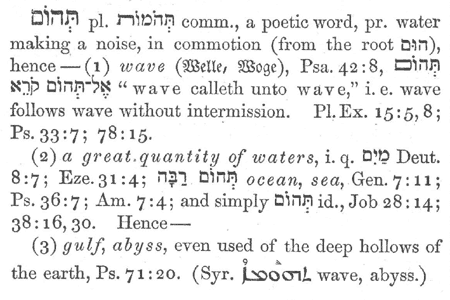Psalm 42:7 inspires the imagination, but do we actually get the translation right? Do we really understand what this verse means?
I’ll quote the King James here:
Deep calleth unto deep at the noise of thy waterspouts:
all thy waves and thy billows are gone over me.
Ok, so for an updated-sounding translation, here’s the ESV:
Deep calls to deep at the roar of your waterfalls;
all your breakers and your waves have gone over me.
Often, people use this verse to describe the nature of prayer–a “calling out” from deep within oneself to deep within God. You can get a sense for it from the songs which quote this verse like “Deep Calls to Deep” by Mary-Kathryn or Matt Redman’s song by the same name. You can get a sense for the Christian preaching inspired by this line from Benny Hinn talking about intimacy with God. There are many other sermons, homilies, songs and inspiring Christian reflections on this phrase. But, do we really get it right? I think not.
The typical interpretation in these Christian reflections tries to associate the phrase to a personal communication between God and the soul. However, I think our Psalmist is actually trying to poetically describe water. Yep, water. Notice the rest of the verse about waterfalls and waves. The phrase “tehom el-tehom qore“. The ever-helpful Blue Letter Bible gives us a dictionary entry on the significant word here, tehom “deep”:

Notice the relevant line: “‘wave calleth unto wave,’ i. e. wave follows wave without intermission.” The word tehom normally is referring to a big body of water like the sea. Here though, the psalmist is talking about moving water, wave after wave, or in the case of a waterfall, crash after crash of the water from above. “Deep calls to deep” describes as best as a poet can the awesome power, repeated crashing and visual impact of wave after wave, not the cry of the heart.
Now of course, this verse does come in the context of a poem about intimacy with God, which describes thirst for God, the joy of his presence and the terror of his loss. It deals with the depths of despair and conflict and the agony of tearful longing for God. But the personal dimension is at the end of this verse rather than the beginning. It says: “your breakers and your waves have gone over me.” The Psalmist feels overwhelmed by the darkness and despair he is experiencing, hitting him with wave after wave. He is mourning and oppressed (v. 9). He seeks hope, but finds taunting. His prayer is to be released from the overwhelming waters of darkness into intimate union with God. So, yes, this Psalm is about intimacy with God, but somehow we have a hard time getting the details right.

